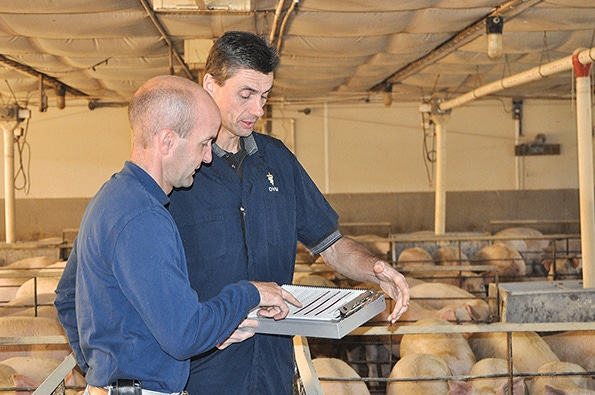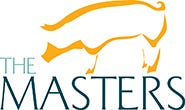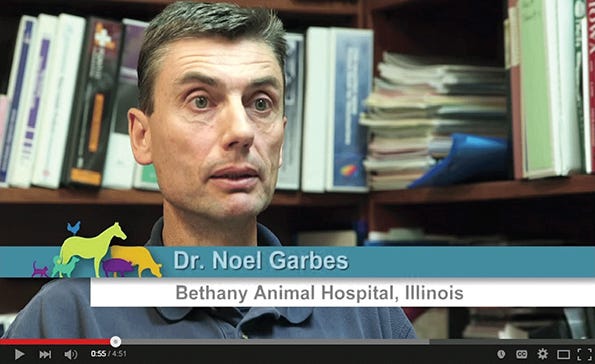The Masters of the Pork Industry are a very special, handpicked group of pork industry leaders. These are their stories. The Masters share their personal stories and philosophies about life, their careers in the pork industry and their visions for the future. They are professionals, entrepreneurs and family-based pork industry enthusiasts whose dedication and wisdom are sure to inspire young and old as they tackle the challenges and opportunities that lie ahead in an ever-changing global pork industry.

Noel Garbes, DVM, would humbly tell you he is just a normal veterinarian helping his clients to raise healthy animals. Yet, after visiting with Garbes for a few minutes, it is obvious that he has an authentic passion for pigs and people.
“Caring” is the one word his co-workers use to describe the man who has few boastful words to utter about himself. He will go the extra mile just to make things easier on staff members or clients, including giving up weekends and nights. His actions speak volumes for his deep level of care.
Deep-rooted farm values
From an early age, Garbes knew he wanted to be involved in animal agriculture in some fashion. He loves working with animals and being on the farm. As a veterinarian, he gets the best of both worlds.
Garbes credits his solid work ethnic to his parents and growing up on a farm in north-central Iowa. During his high school years, his father retired and left the family hog production up to him and his brother. That also helped fund his higher education.
Although he was involved in dairy, beef and swine production as a youth, Garbes has always been naturally drawn to hogs, which formed his passion for the species.
After earning his Doctor of Veterinarian Medicine degree from Iowa State University, Garbes packed his bags for Spring Valley, Minn., working primarily with dairy, but he knew he wanted to eventually center his career around pigs.
So when a classmate told him about the opening at the Bethany Animal Hospital, he set his efforts toward joining the practice in the second-largest pork-producing county in Illinois — DeKalb.
After accepting his current position as an associate swine veterinarian over 17 years ago, he and his wife, Robyn, moved to the land of Lincoln. They have five children — four daughters, Nekoda Rose, Ratasha, Neriah and Raysa; and one son, Noelan. The oldest is a college graduate teaching in the Dominican Republic while the youngest two are in middle school. Garbes says there is a small part of him that wishes he raised his kids on the farm, but at the end of the day, he hopes he passed on the strong farm work ethic.
For Garbes, joining the Bethany Animal Hospital in Sycamore, Ill., was a natural fit. The large-animal practice, serving mostly family-owned and operated hog farms, shares his values of genuinely caring for the animals, but also takes the role of mentor seriously.
“It has also been my [and the clinic’s] philosophy to be on the farm,” Garbes says. “It is about hands-on, spending more time there rather than consulting from the office.”
Educating producers, consumers
Rusty Sobasky, Zoetis regional account manager, says Garbes has a unique approach with his clients. He does not just diagnose the problem, give instructions and move on to the next appointment. His approach with the producers starts with listening and asking them many questions, including desirable outcome. Collectively, they develop a game plan that is based on sound science and practicality.
“He is so approachable about any problem. He does not have a canned answer. He does not have a canned approach,” Sobasky says. “Everything is a unique situation but let’s fix it. This is how we’ve done it in the past, but it does not mean this is how we have to do it in the future.”
The fact the youngest members on the hog farm do not hesitate to call Garbes for advice is testimony to his amiable personality. He does have a soft spot for the youngest clients. Garbes’ eyes light up when he talks about interacting with youth involved in raising livestock.
His own personal experiences raising hogs on the family farm help him innately relate to younger producers. Growing up, Garbes vividly remembers being in the barn when the veterinarian came and not understanding.
“One of the problems I had was I did not know what the vet was doing. He was not very talkative and did not say much,” Garbes says. “I always have to catch myself. I always need to do better.” Personally knowing the youth are curious and eager to learn, Garbes makes it point to stop, explain further and not assume they understand.
Clear communication is important when working with hog producers of all ages, Garbes notes. Many times he speaks with managers and goes over a treatment plan, but the complete details are not always properly relayed to the employee or the family member actually handling the task, whether it is management protocol or administrating medicine.
Often, workers in hog facilities do not speak English as their native language, creating a language barrier. Garbes frankly admits it can also be a challenge for him. He has to make the effort to make sure all parties involved in the conversation comprehend. It may simply mean taking the language down a level and actually asking if they understand.
While communication is a large part of the job for Garbes, so is education. Early in his career, Garbes understood that education is vital to animal agriculture on and off the farm.
Pork production is more than just raising healthy animals and providing safe pork products. In order to have a profitable business, producers must understand the ever-changing government regulations and utilize documented science to guide animal welfare and environmental practices, along with fostering good neighbor relations.
Today, animal welfare is huge. Many things have changed over the years since Garbes’ own days of raising hogs outdoors and filling facilities to capacity without hearing one criticism from the non-agriculture community. He views his role as the veterinarian as one of providing the education and the information necessary for the welfare of the pig and assisting the hog producers to be successful in business.
Jointly, he and his colleagues have invested time with producers, creating a strong relationship built on trust and establishing confidence in the scientific advice in all aspects of pork production.
The Bethany Animal Hospital staff routinely hosts educational meetings, bringing hog farmers, family members and their employees of all ages from different sizes of operations together to learn.
Garbes notes that investing in educating those involved in pork production has nurtured his clients’ openness to accept new concepts, technology and perspectives. Also, it provides an atmosphere for sharing information and ideas with fellow producers.
Undoubtedly, his ability to be real and heartfelt with not just hog farmers but everyone makes him a master in his field. Garbes is always willing to teach others. The solid client-doctor bond supports his belief in sharing his knowledge with the public, hog producers worldwide and colleagues.
Working at a veterinarian practice just 60 miles northwest of Chicago creates the opportunity to open the hog farms up to the general public and international visitors. Trusting Garbes, his clients join him in sharing their personal stories with many who have never seen a pig before.
Assisting hog farmers surrounded by a heavily populated area also creates obstacles. Garbes and the staff work hard to guide clients in being good neighbors and showing the contributions their business makes in the community.
Sharing the real pig farming stories and showing what a normal day in the hog barn looks like does help build the public’s trust, but also provides a chance for producers and himself to hear the average person’s concerns, Garbes notes.
“Some of their preconceived notions are what they have read, but when they get out to the barn, it is incredible how they interact with the pigs and how everything is different,” Garbes says.
For example, seeing firsthand the gestation stalls and watching how aggressive sows are with each other becomes more real and starts to make more sense to them versus viewing it on the Internet.
As a featured expert on the YouTube “Veterinarians on Call” series presented by Zoetis, Garbes is not afraid to go on camera along with clients to tell their personal experience about raising pigs to the world.
Professionals interacting with Garbes also see his master characteristics. Sobasky says it does not matter if you are a stranger or a lifelong friend, his genuineness shines through.
“He is so well-respected in the veterinarian community. His opinion matters not only with the vets he works with, but also outside of his close-knit group of vets,” Sobasky says. “Many want to emulate what Dr. Garbes does, very interested in how he handles himself and the situations that he is put in with the pigs.”
More importantly, Garbes is grounded in a strong science base. Sobasky notes that his colleagues rely on him for his scientific knowledge and his ability to keep up with the most recent information.
His colleagues explain that he is always researching, questioning and looking for new ways to improve swine health, which is a true asset for the business.
As part of the business, the Bethany Animal Hospital professionally manages sow units filled with several clients’ pigs. The managers, employees of the clinic, rely on Garbes’ advice on swine health issues. All the managers appreciate him for his incredible attention to detail, the ability to answer even the smallest of questions and assist them to make health management decisions that fit with in the budget.
He has been instrumental in the clinic’s Northern Illinois PRRS [porcine reproductive and respiratory syndrome] Area Regional Control project concentrated on controlling disease. The strong relationship with local hog farmers allowed the project to quickly get off the ground. A large portion of the project involved the producers’ willingness to share data and trust the information will be secure. Since the project began in 2010, the actual disease infecting the hog farms has changed, but the attention to controlling and eliminating the disease from the operations did not.
Believing in educating others, Garbes has shared the lessons learned not just within Illinois but with the pork community around the world, presenting at last year’s World Pork Expo.
Personal philosophy
Garbes does not see himself as a master. He credits a network of mentors, relationships with professionals in his field and the Bethany Animal Hospital team for his accomplishments.
“I feel blessed to be able to work with great people, an amazing animal and in the veterinary profession,” Garbes says. “I would be wrong if I failed to acknowledge that God alone has provided many opportunities for me in this profession and is behind all that I have accomplished.”
When all is said and done, Garbes says the example his parents set and his hours working on the farm formed his values, teaching him to make every waking hour count.
About the Author(s)
You May Also Like



